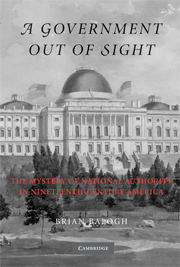Book contents
- Frontmatter
- Contents
- Acknowledgments
- 1 Introduction: Why Look Back?
- 2 How Americans Lost Sight of the State: Adapting Republican Virtue to Liberal Self-Interest
- 3 Between Revolutions: The Promise of the Developmental Vision
- 4 “To Strengthen and Perpetuate that Union”: Republican Political Economy
- 5 Outside the Boundaries: “Powers and Energies in the Extreme Parts”
- 6 The Uncontested State: Letters, Law, Localities
- 7 Restoring “Spontaneous Action and Self-Regulation”: Civil War and Civil Society
- 8 Judicial Exceptions to Gilded Age Laissez-Faire
- 9 “A Special Form of Associative Action”: New Liberalism and the National Integration of Public and Private
- 10 Conclusion: Sighting the Twentieth-Century State
- Index
2 - How Americans Lost Sight of the State: Adapting Republican Virtue to Liberal Self-Interest
Published online by Cambridge University Press: 05 August 2012
- Frontmatter
- Contents
- Acknowledgments
- 1 Introduction: Why Look Back?
- 2 How Americans Lost Sight of the State: Adapting Republican Virtue to Liberal Self-Interest
- 3 Between Revolutions: The Promise of the Developmental Vision
- 4 “To Strengthen and Perpetuate that Union”: Republican Political Economy
- 5 Outside the Boundaries: “Powers and Energies in the Extreme Parts”
- 6 The Uncontested State: Letters, Law, Localities
- 7 Restoring “Spontaneous Action and Self-Regulation”: Civil War and Civil Society
- 8 Judicial Exceptions to Gilded Age Laissez-Faire
- 9 “A Special Form of Associative Action”: New Liberalism and the National Integration of Public and Private
- 10 Conclusion: Sighting the Twentieth-Century State
- Index
Summary
The republican ideas that informed leading thinkers resonate today in America's distrust of distant authority. Yet this vigilance was only one part of the compound known as republicanism. Lost today is an element in republican thought that supported an expansive view of governance. Indeed, from a republican perspective, vigilance was essential because the polity was all-encompassing. Granting so much authority to the government required extraordinary citizens. As long as those who governed remained virtuous, and citizens remained engaged, government could be trusted to carry out an ambitious agenda, enlightened British North Americans believed. This complex compound of authority and scrutiny worked best at the local level. Government was most active there, intervening in the economy and sharply proscribing the rights and prospects of women, not to mention slaves.
From this republican perspective, politics structured everything else. In the eyes of the founders, social divisions and economic relationships were the product of, not the foundation for, the political order. It is this republican conception of the relationship between politics and the rest of the society that students of American political development have neglected.
We should not judge contemporary scholars too harshly for ignoring what was at best, a fragile, idealized conception of governance. Even some of the founders who had embedded republican ideas in the Constitution narrowed their conception of the proper role of the central government by the early nineteenth century, going so far as to charge their Federalist counterparts with the Tory tendency to “consolidate” the executive and judicial branches of government. Men like Jefferson leveled these charges, laying the groundwork for more than two centuries of antistatist rhetoric.
Jeffersonians warned of “consolidation,” even as they pursued bold national initiatives like the Louisiana Purchase.
- Type
- Chapter
- Information
- A Government Out of SightThe Mystery of National Authority in Nineteenth-Century America, pp. 18 - 52Publisher: Cambridge University PressPrint publication year: 2009



